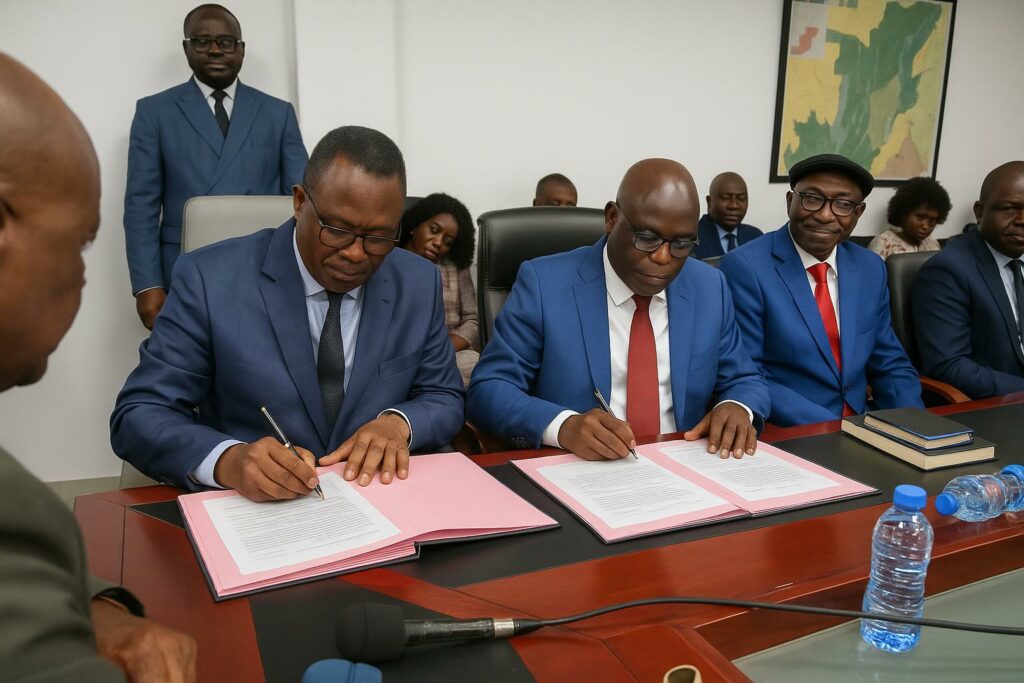Strategic Signing in the Heart of Brazzaville
In a ceremony held on 27 August inside the headquarters of La Nouvelle République, Paul Nestor Mouandzibi, president of the Congrès des chefs d’entreprise du Congo, and Anasth Wilfrid Mbossa, director-general of the national press group, affixed their signatures to what both men described as a “strategic accord” designed to enhance the visibility of private initiatives across the Republic of the Congo. The presence of Antoine Oviebo-Ethaï, director of cabinet to the Minister of Communication, lent governmental gravitas to the occasion and signalled official encouragement for stronger bridges between public information channels and the business community.
Although cooperation between Congolese media and employers’ organisations is not unprecedented, participants underlined the unprecedented scope of this agreement. By formally aligning the largest employers’ congress with a public media consortium that controls print, digital and streaming platforms, they intend to build a durable mechanism for disseminating success stories and investment opportunities.
Media as a Vector of Economic Diplomacy
In his remarks, Mouandzibi emphasised the dual role of the Ccec: first, as a representative body defending the interests of Congolese entrepreneurs; second, as an interlocutor capable of feeding trustworthy information into national policy debates. He asserted that credible and timely communication remains an indispensable precondition for investment, whether domestic or foreign. By selecting La Nouvelle République as its primary media ally, the congress seeks an outlet already attuned to institutional discourse yet increasingly agile in the digital sphere.
Mbossa responded by framing the agreement as part of the group’s mission to serve as what he called “a vector of democracy and transparency”. From his perspective, public media can only fulfil that mandate if it cultivates direct relationships with productive actors capable of generating employment and innovation. The pact, he argued, therefore situates journalists ‘not as passive observers but as active facilitators of development’—a sentiment echoed by several editors attending the ceremony.
Mutual Gains and the Logic of Co-Branding
Both signatories characterised the pact as a “win-win” arrangement. For the Ccec, dedicated columns, televised segments and digital features will offer sustained coverage of entrepreneurial achievements, thereby helping companies to scale reputation at home and abroad. For La Nouvelle République, the congress’s patronage is expected to broaden its advertising base and supply expert commentary that enriches editorial content.
Observers noted that this symbiosis may also stabilise newsroom finances in a turbulent global media market. Since its creation in 1998 through the fusion of several legacy outlets, La Nouvelle République has diversified into online television and social networks. Yet, like many state-linked organisations, it must continually innovate to retain audience share. Regular access to company case studies, data and spokespersons could give reporters the raw material necessary to expand investigative and analytical formats without incurring prohibitive costs.
A Contemporary Narrative of Prosperity and Respect
Beyond the transactional aspects, the accord carries symbolic weight for Congo-Brazzaville’s broader economic trajectory. Mouandzibi articulated a vision of “building a Congo that is prosperous, modern and respected”—language that mirrors national development plans endorsed by President Denis Sassou Nguesso. By foregrounding private-sector success stories, the initiative dovetails with official efforts to project macroeconomic resilience in the face of commodity volatility.
For policy-makers, a coherent narrative of domestic entrepreneurship can complement hydrocarbon-led revenues with the softer power of innovation branding. As such, the new partnership is likely to be followed closely by foreign missions and multilateral lenders assessing the depth of Congolese private-sector engagement.
Looking Toward Regional and International Audiences
Mbossa hinted that the partnership would not confine itself to the national stage. Through satellite relays and online platforms already accessed by the Congolese diaspora, the group intends to profile enterprises capable of competing in Central African and global markets. The Ccec, for its part, plans to leverage its network of chambers of commerce to syndicate media outputs in neighbouring economies, thereby positioning Congo-Brazzaville as both an investment destination and a source of cross-border entrepreneurship.
Diplomatic observers in Brazzaville view such outward communication as an essential ingredient of economic diplomacy. By coupling consistent media exposure with measurable business achievements, the country may strengthen its negotiating hand in regional trade forums and infrastructural underwriting discussions. The accord signed on 27 August thus occupies a modest but potentially pivotal place in the evolving architecture of public-private cooperation in Congo-Brazzaville.

